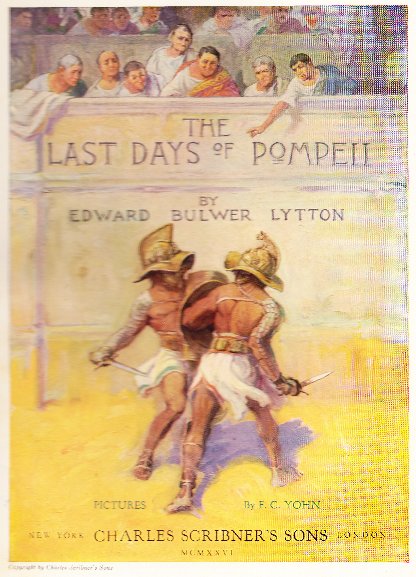In my technical writing circles, the name of Edward Bulwer-Lytton is well-known for a writing contest. The contest is to write a deliberately bad opening line for an awful novel, for example, something beginning with “It was a dark and stormy night…” Well, that’s the beginning of a line by Bulwer-Lytton. He may have been popular in his day, but now, we giggle at his style. Recently, I came across one of his books, The Last Days of Pompeii, and had to share. Without further ado, I present Chapter 1 from the 1926 edition published by Charles Scribner’s Sons for your reading pleasure. (Note the sentence that begins with “He wore no toga…” – it contains 149 words!)
Chapter 1: The Two Gentlemen of Pompeii
“Ho, Diomed, well met! Do you sup with Glaucus to-night?” said a young man of small stature, who wore his tunic in those loose and effeminate folds which proved him to be a gentleman and a coxcomb.
“Alas, no! dear Clodius; he has not invited me,” replied Diomed, a man of portly frame and of middle age. “By Pollux, a scurvy trick ! for they say his suppers are the best in Pompeii.”
“Pretty well — though there is never enough of wine for me. It is not the old Greek blood that flows in his veins, for he pretends that wine makes him dull the next morning.”
“There may be another reason for that thrift,” said Diomed, raising his brows. “With all his conceit and extravagance he is not so rich, I fancy, as he affects to be, and perhaps loves to save his amphorae better than his wit.”
“An additional reason for supping with him while the sesterces last. Next year, Diomed, we must find another Glaucus.”
“He is fond of the dice, too, I hear.”
“He is fond of every pleasure; and while he likes the pleasure of giving suppers, we are all fond of him.”
“Ha, ha, Clodius, that is well said! Have you ever seen my wine-cellars, by-the-by?”
“I think not, my good Diomed.”
“Well, you must sup with me some evening; I have tolerable murænæ [lampreys] in my reservoir, and I will ask Pansa the ædile to meet you.”
“O, no state with me! — Persicos odi apparatus, I am easily contented. Well, the day wanes; I am for the baths — and you —”
“To the quæstor — business of state — afterwards to the temple of Isis. Vale!”
“An ostentatious, bustling, ill-bred fellow,” muttered Clodius to himself, as he sauntered slowly away. “He thinks with his feasts and his wine-cellars to make us forget that he is the son of a freedman; — and so we will, when we do him the honour of winning his money; these rich plebeians are a harvest for us spendthrift nobles.”
Thus soliloquising, Clodius arrived in the Via Domitiana, which was crowded with passengers and chariots, and exhibited all that gay and animated exuberance of life and motion which we find at this day in the streets of Naples.
The bells of the cars as they rapidly glided by each other jingled merrily on the ear, and Clodius with smiles or nods claimed familiar acquaintance with whatever equipage was most elegant or fantastic: in fact, no idler was better known in Pompeii.
“What, Clodius! and how have you slept on your good fortune?” cried, in a pleasant and musical voice, a young man, in a chariot of the most fastidious and graceful fashion. Upon its surface of bronze were elaborately wrought, in the still exquisite workmanship of Greece, reliefs of the Olympian games; the two horses that drew the car were of the rarest breed of Parthia; their slender limbs seemed to disdain the ground and court the air, and yet at the slightest touch of the charioteer, who stood behind the young owner of the equipage, they paused motionless, as if suddenly transformed into stone — lifeless, but lifelike, as one of the breathing wonders of Praxiteles. The owner himself was of that slender and beautiful symmetry from which the sculptors of Athens drew their models; his Grecian origin betrayed itself in his light but clustering locks, and the perfect harmony of his features. He wore no toga, which in the time of the emperors had indeed ceased to be the general distinction of the Romans, and was especially ridiculed by the pretenders to fashion; but his tunic glowed in the richest hues of the Tyrian dye, and the fibulae, or buckles, by which it was fastened, sparkled with emeralds: around his neck was a chain of gold, which in the middle of his breast twisted itself into the form of a serpent’s head, from the mouth of which hung pendent a large signet ring of elaborate and most exquisite workmanship ; the sleeves of the tunic were loose, and fringed at the hand with gold: and across the waist a girdle wrought in arabesque designs, and of the same material as the fringe, served in lieu of pockets for the receptacle of the handkerchief and the purse, the stilus and the tablets.
“My dear Glaucus !” said Clodius, “I rejoice to see that your losses have so little affected your mien. Why, you seem as if you had been inspired by Apollo, and your face shines with happiness like a glory; any one might take you for the winner, and me for the loser.”
“And what is there in the loss or gain of those dull pieces of metal that should change our spirit, my Clodius? By Venus, while yet young, we can cover our full locks with chaplets —while yet the cithara sounds on unsated ears — while yet the smile of Lydia or of Chloe flashes over our veins in which the blood runs so swiftly, so long shall we find delight in the sunny air and make bald time itself but the treasurer of our joys. You sup with me to-night, you know.”
“Who ever forgets the invitation of Glaucus!”
“But which way go you now?”
“Why, I thought of visiting the baths: but it wants yet an hour to the usual time.”
“Well, I will dismiss my chariot, and go with you. So, so, my Phylias,” stroking the horse nearest to him, which by a low neigh and with backward ears playfully acknowledged the courtesy: “a holiday for you to-day. Is he not handsome, Clodius?”
“Worthy of Phoebus,” returned the noble parasite, — “or of Glaucus.”
[The tale of Glaucus and Pompeii’s dark and stormy night unfolds in this style across 425 pages. Look for a copy in your local antiquarian bookstore!]


I particularly loved this bit in the first paragraph: “…wore his tunic in those loose and effeminate folds which proved him to be a gentleman and a coxcomb.” (coxcomb = dandy; yes, I had to look it up).
Thanks for sharing, and thank goodness we rarely have to read fiction in this style these days.
@Rhonda – Yes, that paragraph was a hoot. It clinched my idea of posting the entire chapter. Can you imagine writing a technical specification like this?!